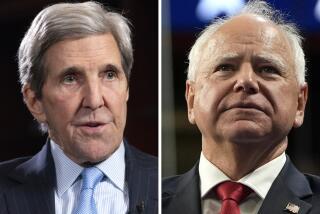Revisits Army Basic Training Site : Dukakis Seeks to Blunt GOP Defense Charges
- Share via
FT. DIX, N.J. — Anticipating renewed Republican charges that he is weak on defense and soft on crime, Democratic presidential nominee Michael S. Dukakis set out Thursday on a two-day campaign swing intended to demonstrate the opposite.
Dukakis said at a speech in New York that he was for a stronger U.S. military “based on sound planning and tough management, not wishful thinking and blank checks.”
And he returned to this steamy, sprawling Army base where he underwent basic training in 1955 before serving 16 months as a Teletype operator in post-war Korea. In his visit to Ft. Dix and adjacent McGuire Air Force Base, he fired three shots from an M-16 on a rifle range, toured a giant C-141 cargo aircraft, and practiced on a tank simulator.
Speaks at Camp Gate
“We need strong, well-trained, properly equipped forces,” Dukakis said at the camp gate afterward, as House Armed Services Chairman Les Aspin stood by his side.
Dukakis will fly to Jacksonville, Fla., today to boast about his state’s falling crime rates and to blast what he has called the failure of the Reagan Administration to stem the flow of drugs into the country, aides said.
The aides said they know Dukakis will get “flogged” on defense issues at the Republican National Convention in New Orleans next week. And they acknowledged that so far he has offered very few specific proposals for changing Pentagon operations or spending.
“He’s going to look at what the needs are,” said Madeleine Albright, a senior policy adviser. “I know he wants to take a look at the Pentagon books.”
Seeks to Draw Contrast
Dukakis aides also said the undercurrent of his remarks was a call for “new leadership.” The point, they said, was to draw a contrast with Vice President George Bush, who will receive the Republican presidential nomination next week.
“He was defining the quality of leadership that the American people are going to need for the challenges of the next decade,” said deputy issues director James Steinberg.
But the point may have been lost at Dukakis’ speech before about 300 people at New York University in Lower Manhattan. Dukakis received considerably more applause when he arrived than after he spoke.
New York Gov. Mario M. Cuomo gave Dukakis a warm introduction. But New York City’s volatile mayor, Edward I. Koch, who stirred bitter feelings during the New York primary by his attacks on the Rev. Jesse Jackson on behalf of then-candidate Sen. Albert Gore Jr., yawned repeatedly in the front row during the speech and barely applauded at its conclusion.
Gets No Encouragement
Koch told reporters later he will willingly campaign for Dukakis but would “appreciate encouragement.” Has he gotten any? “No,” the mayor snapped.
In his speech, Dukakis argued for applying “common sense to our common defense.”
“The test of a successful defense policy isn’t how much money we spend, it’s how much security we buy,” he said. “And for the past eight years, we haven’t gotten what we’ve gone into debt for.”
Dukakis called for enhancing the nation’s conventional forces, particularly through better training, new anti-tank technology and increasing spending for spare parts and ammunition. He and his advisers declined to say how much the changes are likely to cost.
Dukakis said he would “take up” Soviet leader Mikhail S. Gorbachev’s challenge to negotiate cuts in conventional forces in Europe “with deeper cuts on the Soviet side.”
Praise for Reagan
He said the nation “does not require the seemingly endless development of new and more expensive nuclear weapons systems” and praised President Reagan and Gorbachev for signing a treaty to eliminate intermediate-range nuclear missiles in Europe.
In Washington, Bush disputed Dukakis’ contention that the Reagan Administration was not giving taxpayers their money’s worth in national defense.
“We’ve got a pretty good record in terms of world peace,” Bush said at a meeting with black supporters. “We’ve got a pretty good record in terms of an arms control agreement that says to some little kid in school, ‘You can worry a little bit less about nuclear war because we banished an entire generation of nuclear weapons.’ ”
“We’ve gotten a little something for our money’s worth when we control the Persian Gulf, show the flag for freedom of passage through the straits and then begin to see talks start between Iran and Iraq.”
Staff writer Cathleen Decker in Washington contributed to this story.
More to Read
Get the L.A. Times Politics newsletter
Deeply reported insights into legislation, politics and policy from Sacramento, Washington and beyond. In your inbox twice per week.
You may occasionally receive promotional content from the Los Angeles Times.











